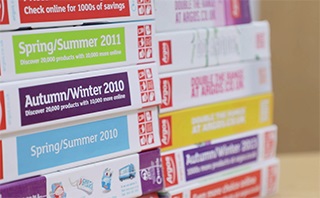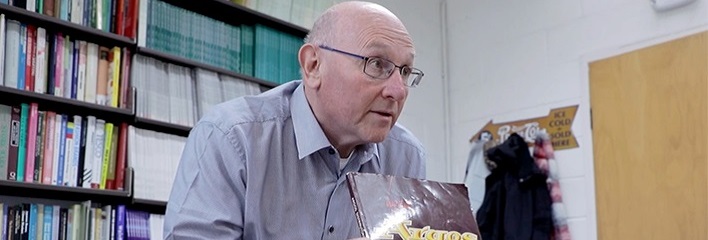A complete collection of Argos catalogues – held by the University of Stirling’s Institute for Retail Studies – has offered a unique insight into changing consumer habits over the years.
The collection of more than 90 catalogues, dating back to 1973, is believed to be the only entire private set in the UK.

Argos catalogues.
It was started by Professor Leigh Sparks after he was given a donation of around 50 catalogues by a collector who was clearing out his attic in preparation for moving house.
Professor Sparks managed to fill the gaps in the original collection by buying older copies of the catalogue on eBay – paying £150 for one early edition – and continued to collect new ones each year.
He said: “As a retail academic and someone who’s interested in retail history, one of the things that is frustrating is you can’t go back into the past to see what shops looked like.
“Our memory is often tainted by the fact we were children and we have a limited memory of prices and products.
“The Argos catalogues provide a record of the products that were on sale and the products that consumers were buying.
“Argos became very big quite quickly and the catalogues were something everyone had. They became a barometer of middle taste.
“They are also a record of the changing products, innovations and patterns that we can’t see in physical retailing because the shops have gone.”
In the early catalogues, sport is represented by the items used to participate in different activities, such as tennis rackets and cricket pads, and all the models are male. In more recent editions, the focus is on sport fitness, with brands and personalities, including female role models, having more importance.
“Sport gets redefined in a particular way,” said Professor Sparks. “Sport was originally seen as a male pursuit and there is nothing to do with female sport in the early catalogues. Looking at the difference across the catalogues you begin to see that change.”
The catalogues also allow researchers to track changes in the style and price of products.
In the early years, electric toasters didn’t come with plugs – customers were expected to wire their own. It was only from the late 1980s that they started to be sold with a plug included.
Steam irons in the earlier catalogues are priced at between £30 and £50 but over the years, with the growth of imports from China and elsewhere, they got cheaper. When new models with different functions were introduced, the price rose again.
Professor Sparks said: “Argos are toying with the idea of getting rid of the catalogues and have been trialling that as so much of the business has moved online. It will be a shame as we will no longer have that record.
“When people look at the catalogues, they very quickly start to say we have that or we had that in our house. It gets people talking about products. No one has a neutral reaction to them.
“For many, they have memories of looking through the catalogue when they were given one as a child to keep them quiet or to draw up a Christmas list. It really feels part of their life.”
Background information
Media enquiries to Rosemary Free, Communications Officer, on 01786 466 169 or rosemary.free@stir.ac.uk

